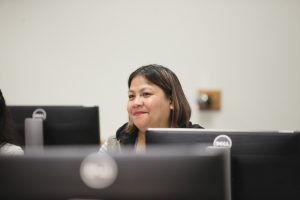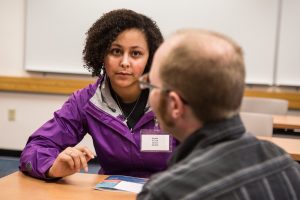At South Puget Sound Community College (SPSCC), opportunities for learning are not limited to college-level courses. Whether a new or returning college attendee, Transition Studies at SPSCC can help students to achieve their academic or career goals. Through a Transition Studies program, students can complete their high school education, learn English language or become more familiar with the college environment before entering college-level classes, and courses range from free to $35.

Adult Basic Education courses at SPSCC are a low-cost method to build basic math, English and computer skills before moving onto pre-college or college-level classes. Adult basic education can help a range of students, whether they are new to community college or are returning for an additional degree.
With six different levels of classes available at SPSCC, the English as a Second Language (ESL) program can help students who are non-native English speakers improve their writing, reading, speaking and listening skills. As part of the ESL program, students can work toward entering pre-college and college level classes.
For students who want to enter a high school completion program, SPSCC offers both High School+ and GED preparation classes. High School+ is an opportunity for students over 18-years-old to earn a high school diploma. Through the High School+ program, students can apply previous academic credits, work and volunteer experience towards their diploma. Students earning a diploma from the High School+ program are also eligible for reduced tuition rates at SPSCC.
For students planning to take the High School Equivalency Test (GED), SPSCC also offers GED preparation classes. A series of four tests, the GED test is for students who have not finished high school and want to earn a certificate that is equivalent to a high school diploma. GED preparation classes teach students subjects that may show up on the test, including basic reading, writing, language arts, math, science and social studies.

Integrated Basic Education and Skills Training, also known as I-BEST, is a program that helps students build their English and math skills while also completing college-level courses. Each I-BEST class is taught by two instructors. One instructor will teach the content of the class, while the second instructor will teach reading, writing or math skills.
Through SPSCC, there are several different I-BEST programs available. In the Academic I-BEST and Professional Technical I-BEST programs, students complete college-level courses in subjects like psychology, while also building math and English skills in pre-college courses.
I-BEST is also available for students who are part of the Beginning Automotive Certificate program or Office Clerk/Receptionist Certificate program. In these I-BEST programs, students can work toward a vocational certificate while also learning reading, writing and math skills from an I-BEST instructor.
“The idea with I-BEST is that students have the opportunity to quickly go from pre-college to college level courses,” explains Angela Holley, adult learner transition specialist at SPSCC. “It’s a way to really increase the rate of progress, but in a supported manner.”
From Adult Basic Education, to High School+, many students participate in more than one Transition Studies program at SPSCC. SPSCC student, Ussumane Nharia, has been involved in several programs since moving to the United States in 2016. After taking multiple ESL courses, Nharia recently completed the High School+ program. In upcoming quarters, Nharia is planning on taking both pre-college and college level courses through the Academic I-BEST program while working toward a degree in Information Technology.

“My life goal is to improve myself to be better than yesterday,” says Nharia. “To be able to feel proud myself for all I’ve been through on my journey. And my employee goals after I complete my education is to get a better job. I’m dreaming one day to work at the Boeing Company.”
Through Transition Studies at SPSCC, a larger pathway is opened for students who wish to pursue a degree, certificate or vocational program. In addition to the academic skills taught in Transition Studies classes, there are also multiple opportunities to explore future education options. Transition Studies instructors are a built-in support for students who wish to learn more about their possible academic futures.
“It’s a part of this pathway that students can begin in Transition Studies and into college classes,” explains Holley. “Our goal is to provide students with information about opportunities for continuing their college education through their two-year degree and into transfer to a four-year university.”
To learn more about Transition Studies at SPSCC, or to register for a Transition Studies program, visit the South Puget Sound Community College website.
Sponsored

















































